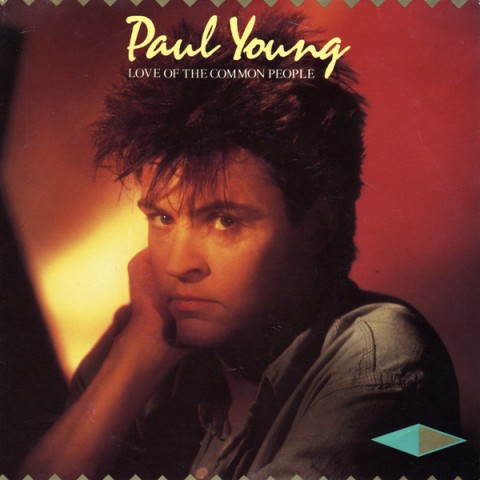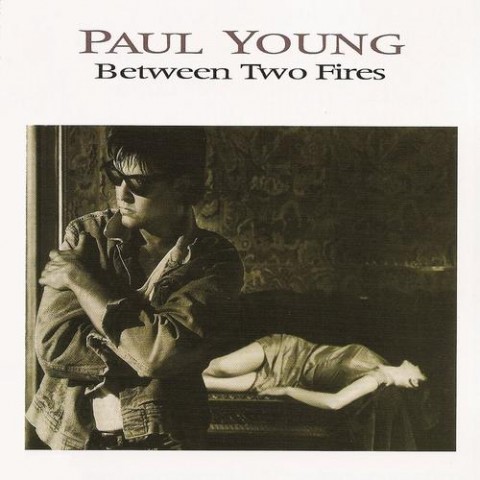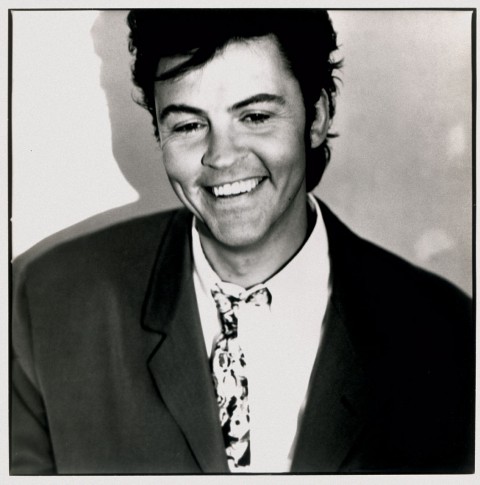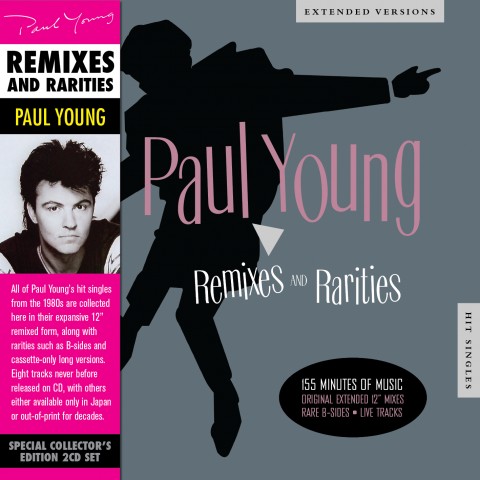Paul Young / Interview
Paul Young‘s new compilation Remixes and Rarities, is officially released today. The album was compiled by SuperDeluxeEdition founder and editor Paul Sinclair. The two-CD set features all of Young’s hit singles from the 1980s in their expansive twelve-inch form, along with rarities such as B-sides, and cassette only long versions. Many tracks are issued on CD for the first time.
Purchasers of Remixes and Rarities will be able to read Paul Young’s exclusive track-by-track commentary in the booklet that comes with the CDs. This was edited down from an interview with the singer conducted by Paul Sinclair back in May.
Today we bring you some further recollections from Paul Young on his first four albums that do not feature in the CD booklet. Enjoy!
SuperDeluxeEdition: You must look back on the 1983-85 period very fondly. Hit singles, hit albums, Band Aid, Live Aid – it seemed like a great period to be a pop star.
Paul Young: Yes, I think I happened along at just the right time to ride that wave. I think if I’d waited any longer I’d have missed it. I was the newest kid on the block, when it came to that Band Aid record, everyone else was more established that I was. I’d just got my first album under my belt, and I think I was working on the second. So it was great to be there in the thick of it.
SDE: Not only were you on the Band Aid record, but you had a very high profile contribution, doing the introduction. That must have helped your profile.
PY: It did, yes. When the record came out, I’d had a little bit of radio play in America, but I was nowhere as big as people like George Michael and Boy George. So they were all going ‘Who’s this guy, singing the first line?’ It was a good introduction for me, to America.
SDE: Was it all as much fun as it looked – Top Of The Pops, video shoots, photo shoots – did you enjoy that side of it?
PY: I enjoyed the road, really. I’ve always enjoyed being on the road. All the way through the Q-tips and Streetband we did a lot of touring, and to me that was my work and some of the other stuff, photo sessions and stuff like that didn’t feel like work. It was a chore, really [laughs], but as soon as I was back on the road again, I was happy.
When I found Laurie [Latham, producer] and we started work on the No Parlez album, he showed me how to enjoy yourself in the studio. It was the first time, I actually enjoyed making a record.
SDE: There is a spirit of fun and ‘anything goes’ with No Parlez. Is that a product of it being a debut album, with things getting more serious and purposeful as you develop your career?
PY: Probably so, yeah. I felt like I was riding the crest of a wave, because I’d been in the Q-Tips, and I wasn’t looking for a solo deal, but it was offered to me, so I thought ‘I must have something’. My confidence levels were high, and I thought where the Q-Tips got it wrong was that we had an old fashioned attitude of setting up in a studio and recording it like we were live. It was pointed out to me by Clive Langer – who we approached about doing a Q-Tips album – that he thought we were too retro. He said ‘Do you listen to any modern music’ and I said ‘yeah, loads’, but he said ‘you don’t really hear it on the Q-tips records’. So I set about putting that straight when I took the solo deal. Laurie’s approach to making albums was that he was fresh out of the George Martin school of production. Laurie was very much into making your own [tape] loops, we’d throw pencils in a piano and see what it sounds like, bash a big sheet of steel and have that as a snare sound. All those weird and wonderful things that the digital age took away from us, really. The physical side of creating a sound.
SDE: Is it right that you were originally just on a singles deal?
PY: No, it was an albums deal, but what happened was they offered me a record deal, I signed it, and Muff Winwood who was the head of A&R, said ‘right, we’re going to get a good soul band around you,and a good producer and we’re going to make the record the Q-Tips should have made’ and I said ‘No we’re not, that’s not what I wanna do!’ [laughs]. ‘I’ve done that, I want to do something new now.’ So they restricted me to no more than two or three tracks at a time. I think they started to get worried that it wasn’t going to go very well, so we’d agree what three songs, and I’d go in and do them. In the second batch of recording, I threw a couple of songs out and said to Laurie, ‘those aren’t working, but I’ve just heard this song Love Of The Common People on the radio – I think we should have a go at that’. So we started working on that and the record company phoned up and said ‘leave the studio, we’re not paying for this’ [laughs] because I’d gone against what we’d agreed.

SDE: Do you recall the approach to the twelve-inch remixes? Some tracks sound as if a long version was recorded and edited down to a seven-inch version, while others appear to be more of a traditional remix.
PY: I think you’re right that with the second album we did stretch the songs out a little bit more and edit them down, for the single. I like tracks that are about four or five minutes long, especially on albums. We may have had the best intentions of trying to do an arrangement that was 3′ 30”, or something like that, but the best intentions don’t always work out, so they ended up being a little bit longer and we liked it that way. So we just edited it down for the single.
SDE: Love Of The Common People was a hit the second time around, before Christmas 1983
PY: There was a lot of commotion going on about the fact that I’d recorded a Joy Division song, and made it a pop song. Some bands were angry about it, and I sympathise with them to a certain extent, because I know what it’s like. I idolise the band Free, and some people have done terrible versions of All Right Now, and you think ‘Leave it alone!’. So I didn’t want to rub it in their faces, but the record company said ‘we should put that out as a single’, but I said ‘no don’t do that’, because I kind of felt their pain. And also I didn’t really want to. I felt it was a great album track and it would help sell the album. So I suggested we re-release Love Of The Common People because it already had sleigh bells on it. We put them on as a sound, not because we had any thoughts of releasing it at Christmas, but looking back, it seems like it was perfect.
SDE: That song introduced a long of people to Kim and Maz [“The Wealthy Tarts”] and those very distinctive backing vocals. How was it working with them? The vocal arrangements and the quality of their performances were amazing.
PY: I remember they were the most original backing singers I’d ever seen or heard. Not only did they look different, but they could do that soul and R&B thing, if you wanted them to. I didn’t want to do that because I was trying to bring myself up-to-date, so the first thing I got them in to do was Iron Out The Rough Spots, and Love Of The Common People. We hadn’t got Pino [Palladino, bass player] at that point but he was going out with Maz and she would bring rough mixes back, and he’d go ‘I’d love to play on that’, but what I loved about them was you could ask them to do anything and they’d have a go, which is a trait you don’t get a lot with English musicians. They were very good, they never missed a trick.
SDE: With The Secret of Association, did you have a specific gameplay in terms of how that was going to sound, because it does sound different from the first album?
PY: It does sound very different, doesn’t it? It was a reflection of everything that had happened to us, and you have to do a lot of growing up when you get success – your whole life changes. The manager’s comment when we’d almost completed it was that it was too adult, too serious – where’s our sense of fun gone. It was a more adult sounding album and I think he was intimating that there wasn’t enough ‘pop’ on it.
SDE: I’m Gonna Tear Your Playhouse Down could be viewed as a transitional song between the first and second albums because Kim and Maz feature heavily on that track, but they don’t appear much on the rest of The Secret of Association.
PY: They’d already decided to take the solo path at that point, so they didn’t want to tour any more. So we thought if we’ve not got Kim and Maz, getting other girls would almost be a backwards step. So we decided we’d go for male voices on the next album.
SDE: …Which lends it a bit more of a soulful sound
PY: The sound of the album is a bit tougher and wilder. I think it was almost like, subconsciously, we knew we had to do something to pull it back in to more of an R&B type sound.
SDE: Every Time You Go Away was a massive hit and a number one in America, that must have been an amazing feeling.
PY: Yes it was. I’d been working myself to death, really. I collapsed from exhaustion during the first tour of America. I did way, way too much, for what the human body is capable of doing. Sleep deprivation, live shows, TV interviews, newspaper interviews – it never stopped for 14 days. We did 13 shows in 14 days and press – it was absolutely manic. And then I damaged my voice. So it was great to be able to come back [for the second tour], with not just a hit record, but a number one in America.
SDE: The extended version of I Was In Chains [previously only available on cassette] ends the new Remixes and Rarities compilation. It’s lovely track and a classic album-ender.
Paul Young: This is one of the things that really upsets me about the way the internet has affected the music industry. Album tracks are just not worth doing anymore, because people don’t buy albums. When you bought an album and they took you on musical journey, making you feel happy and sad, and maybe putting you in a certain place, or a country – if you close your eyes. That’s one reason why I’ve never liked videos that much, because I think music should put pictures in your head. So we’re mourning the death of the great album track, really. It’s a real shame. When you get a review these days or an album, it just says it’s a really good album, and points out the best three tracks and then bang, bang, bang, people download them and don’t buy any more.

SDE: There was a different approach with Between Two Fires. You co-produced it with [keyboard player] Ian Kewley and [producer] Hugh Padgham and you wrote most of the songs on the record. What was the thinking behind that? Were you looking for new inspiration?
PY: We were really getting leaned on heavily, by America, because they couldn’t categorise me. I take that as a complement, but Americans see that as a big problem [laughs].
SDE: Was that a difficult decision, to say goodbye to Laurie and move on?
PY: It was, but I was finding it harder and harder to get my ideas across. I felt like Laurie and Ian were starting to work against me. When I had ideas, they might say ‘no, that won’t work’ and I’d think ‘well, try it please’ and in the end you have to assert a bit of authority, because my name’s on the front. So that was part of the reason, and because of America, we thought maybe Hugh Padgham might understand that market better than we did, having been so successful with Phil Collins.
SDE: Tell us about, the lead single from that record, Wonderland.
PY: It was a song that was sent to us. It might have been another one of those songs that was around for the second album, but we didn’t do it. We just thought it was a beautiful song. If I’m honest, I thought ‘let me take you back to wonderland’ was a bit twee, but the rest of the lyrics were so beautiful, and I tried to think of another way of saying that, and I couldn’t, so that’s why it is what it is. I wanted to do a slow build, a slow burner track.
SDE: Do you think the slow burning element impacted on the chart success of that track, because it didn’t match up to what you’d achieved previously.
PY: I think, basically, we were pushed into trying to make an album that had one uniform sound all the way through it, and in actual fact it didn’t do me any favours at all, because Americans still didn’t like it, and we alienated some of the fans in Europe, so I chucked that idea out.
SDE: Between Two Fires seemed to come out relatively quickly after The Secret Of Association. Were you under pressure to get something out?
PY: No, I think we’d toured about as much as we could tour and we knew we had to get ready for another album. It’s strange that it wasn’t a long gap because we had to write a bunch of songs for the new record.

SDE: There was a sizeable gap between your third album and the follow-up Other Voices, and you scrapped some early sessions. What happened there?
PY: We went back to working with Laurie, but I think like some marriages, you grow, and then you grow in different directions. So we got back together, and Laurie’s idea was to go back to just the three of us – me, Ian [Kewley] and him – and work on the tracks. So we upgraded all of our equipment at that time, with the latest drum machine and a whole bunch of other things. But none of us were technical enough to know how to work it. Laurie was always meticulous, but when all three of us couldn’t work the drum machine, I was thinking we should have got someone in. It was painfully slow for me and I was beginning to lose interest, because it was taking so long. I said to my manager, ‘I’m starting to feel a bit hemmed in, and I’m starting to feel a bit jealous of Pino, who goes off to work with all these great artists and comes back fresh, brimming with ideas’. So I said ‘maybe I need to start working with a variety of different people’. So that was the reason behind it.
SDE: Even though you were playing with new people, some tracks, such as Heaven Can Wait, still had people like Pino on bass.
PY: Yes. On this album, I thought “I’ve met a lot of famous people over the years, so it’s about time I pulled in a favour or two”. So to get Dave Gilmour to play on it was an absolute bonus. I was going completely mad by this point and I actually wanted Elton John to play on it. I thought, how cool would that be, for him to do a session as a piano player, which he used to do a lot in the late sixties, early seventies and [he] probably hadn’t done it a that point for a long time. I can’t remember why it didn’t happen…
SDE: Maybe budget? This record must have cost a fortune…
PY: [Hearty chuckle] Yes, probably!
SDE: So were you in the studio with Chaka Khan, or did she do that remotely.
PY: Oh yes, she did Stop On By as well. What happened was I was cutting the album, doing the Warne Livesey tracks, at Olympic Studios in Barnes. Stevie Wonder was playing at Wembley and it was his birthday and it was going to be on the BBC. They wanted to get a load of stars to come along and sing him Happy Birthday – so we all got up and sang it and Chaka was there and I said ‘I can’t believe you are here and I’m cutting the Bobby Womack track that you did when you were in Rufus’. She said ‘Stop On By? We could slay that track, is it okay if I sing it with you?’ ‘Okay, sure!’ So she came along to do the vocal on Stop On By, and as we were doing that we asked if she’d do the harmony vocal on Heaven Can Wait, and it just sounded right.
Paul Young was talking to Paul Sinclair for SuperDeluxeEdition. Remixes and Rarities is out now.

 Interview
Interview


My copy arrived today from Amazon Canada. Packaging is excellent. Will rev the CDs up on the way to work tomorrow. Thanks for this labour of love!
[…] Laurie Latham was talking to Paul Sinclair for SuperDeluxeEdition. Remixes and Rarities is out now on Cherry Pop. Read our interview with Paul himself here. […]
I have to say ‘thank you’! This cd is absolutely fantastic attention to detail and clearly a labour of love – if only all deluxe reissues were at this level. The fold out booklet – amazing. The mastering – amazing. The obi strip – super amazing! It’s also reminded me how quite brilliant Paul Young’s music is, and I’m ashamed to say I’ve not listened to Paul Young in too long a time.
I really really hope this does well, and paves the way for others… Alison Moyet; Billy Ocean; Kim Wilde; Dead Or Alive are all equally deserving of a collection as wonderful as this. Thank you.
Another excellent interview! Between Two Fires is a very underrated record; I get why it’s not universally loved, and even why it didn’t do so well commercially, but it has some great moments.
Thanks Eric. BTF has it’s moments, but definitely a disappointment after the two strong offerings beforehand.
That’s true…Secret Of Association in particular was a fantastic, varied album. Having some of those (cassette-only) extended mixes on this new CD is great.
Yes, I very much doubt that “I Was In Chains” would ever have been issued on CD in its long form, if I hadn’t put it on R&R. God knows why Edsel didn’t include it in their deluxe from 2007!
Fantastic interviews! Is it possible to purchase this album in Canada?
Great interview, did you ask him if he’d ever do a solo tour again as headliner?
I have to say I’d love Paul to do another Q-Tips album – or even a small venues Q-Tips tour (Half-Moon Putney anyone?).
His voice was so great – young and raw – and most people have never even heard of the Q-tips. The BBC in concert programme they did was fantastic!
I can’t wait for this collection to arrive here in Toronto, Canada. Great interview.
Thanks Tom – hope you enjoy R&R when it arrives!
You should have asked him where the Tomb Of Memories (12” Mix) actually came from.
I did ask him that. He had no idea. To be honest I don’t think he was even aware that 12″ version existed!
This is what a 12″ compilation should be !
Wonderful remixes – some great rarities.
Thanks Paul & Paul.
Maybe interesting for you is the fact that on the 12″ of “Every Time You Go Away” is an alternate version of “This Means Anything” on the b-side
with different arrangement as on the regular album version.
Hi Daniel – thanks so much. “This Means Anything” will end up on a Volume Two… if that happens!
Thanks Paul.
Another interesting interview. You must be excited about the CD being out today!
Thanks Mike. Yes, it’s great that the CD is finally out. Looking forward to hearing what people think of it!